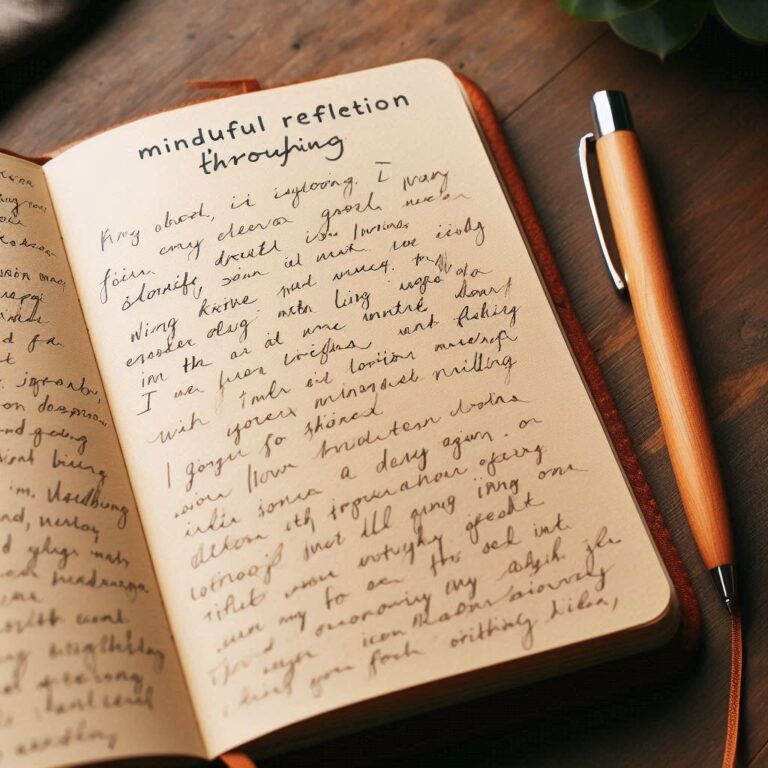Mindful Journaling
How Writing Can Transform Your Emotional Well-Being
Unlock the Power of Pen and Paper to Foster Emotional Health and Find Inner Peace
Introduction:
Have you ever found yourself caught in a whirlwind of thoughts, feeling overwhelmed by everything going on around you? We’ve all been there, trying to juggle emotions, responsibilities, and expectations. But what if there was a simple tool that could help you regain control, calm your mind, and improve your emotional health? It turns out, mindful journaling might be exactly what you need.
This practice is not just about writing down your day-to-day thoughts – it’s about tuning into your inner self, acknowledging your feelings, and fostering a deeper understanding of your emotions. In this blog post, we’ll dive into how mindful journaling can enhance your emotional well-being, and I’ll share real-life stories and actionable tips to get you started. By the end, you’ll have the tools to harness the power of writing and make it a life-changing habit. Ready to explore the healing power of your pen?
Ever feel like your emotions are running the show?
I remember a time when my mind felt like an overpacked suitcase—thoughts spilling out everywhere, nothing in order, and emotional stress making everything feel 10x heavier. I was constantly anxious, stuck in my head, and overwhelmed by things I couldn’t even name. A friend casually mentioned something about mindful journaling—honestly, I didn’t think much of it. I mean, how could writing about my feelings possibly do anything?
Fast forward a few weeks, and I’m sitting on my couch, pen in hand, pouring out thoughts I didn’t even know I had. And guess what? It helped. A lot.
In this post, we’re going to explore how journaling, especially with mindfulness in mind, can be a real game-changer for your emotional health. You’ll learn the how, the why, and some no-fluff, real-life tips to get started today. Whether you’re navigating anxiety, stress, or just trying to feel more in tune with yourself, this is for you.
🧠 Why Mindful Journaling Works (And It’s Not Just Woo-Woo Stuff)
Mindful journaling isn’t your typical “Dear Diary” routine. It’s intentional. It’s about being present with your thoughts instead of judging them, escaping them, or pushing them aside.
Think of it as emotional decluttering.
By writing down what you feel without filtering, you’re giving your brain permission to process emotions instead of suppressing them. Studies have shown that expressive writing can reduce stress, manage anxiety, and improve overall mental clarity.
And here’s the wild part—it’s free, portable, and you don’t need any fancy equipment.
✍️ “I Tried Mindful Journaling and This Happened…” (Real-Life Inspiration)
Let’s talk about Jess, a 32-year-old freelance designer from Austin. She used to have panic attacks before client meetings. After a therapist suggested mindful journaling, she gave it a go—reluctantly.
“I started with just five minutes in the morning. I’d write exactly how I felt without trying to make it pretty or profound. Within a month, I wasn’t spiraling before every call. Journaling became my safe space.”
Or consider Marcus from Vancouver, who battled insomnia for years. He started journaling every night, focusing on gratitude and stress triggers. Not only did his sleep improve, but he said he felt like he “reclaimed his evenings.”

🤔 Is Mindful Journaling Right for You? (Spoiler: Probably Yes)
You don’t need to be a writer. You don’t need to commit an hour a day. You don’t even need to spell things correctly.
Here are some signs you might benefit from mindful journaling:
- You often feel emotionally overwhelmed
- Your thoughts keep you up at night
- You struggle to understand why you’re feeling what you’re feeling
- You’re stuck in negative self-talk loops
- You want to cultivate more self-awareness or gratitude
Still unsure? Ask yourself this: Would you feel better if you could mentally “offload” some of what you’re carrying?
That’s what mindful journaling does.
💡 How to Start a Mindful Journaling Practice (Even If You’ve Never Done It Before)
No need to overthink it. Here’s how to get started without getting stuck:
- Set the Mood
Create a space that feels calm. Light a candle. Brew some tea. Put on instrumental music. Make it a vibe. You’re telling your brain, “Hey, it’s safe to open up here.”
- Choose Your Time
Morning pages? Bedtime brain-dumps? Find a time that feels natural and stick with it. Consistency builds habit—and eventually, healing.
- Use Simple Prompts (Here’s a Few to Try)
These long-tail, low-competition queries also help you dive deep:
- What emotion have I been avoiding today?
- What do I need more of right now—and how can I give that to myself?
- What would I tell my younger self about how to handle stress?
- Write Without Editing
This is key. Don’t censor yourself. Don’t worry about grammar or “making sense.” Your only job is to be real with yourself.

🔍 Problem-Solving Through Writing: It’s Not Just Reflective, It’s Strategic
One of the most underrated benefits? Problem-solving.
When you externalize your emotions onto paper, you can start to notice patterns, identify triggers, and even develop action steps. It’s like having a conversation with your wiser self.
You can ask:
- What’s really bothering me beneath the surface?
- Is this fear based on fact or assumption?
- What can I control right now?
People often Google things like “how to stop overthinking at night” or “how to regulate emotions naturally.” Journaling gives you the clarity you need to answer those questions for yourself.
🌎 The Local Angle: Mindful Journaling in Your Daily Life
If you’re in a noisy city, or work in a high-stress environment, journaling might be your only quiet moment of the day. Think of it as your emotional anchor.
You can even take it local and niche:
- Find a quiet spot at your neighborhood park
- Join a journaling meetup in your area (check local Facebook groups or Eventbrite)
- Support local bookstores by grabbing a unique journal that inspires you to write
✅ Quick Tips to Stay Consistent Without Burning Out
- Keep your journal visible—out of sight = out of mind
- Don’t force it. Even a few words count.
- Use voice notes if you’re not into writing
- Mix in doodles or stickers if that’s your style
- Celebrate progress, not perfection
🧡 Final Thoughts: You Deserve to Feel Heard—Even If It’s Just by You
You don’t need to wait for someone to ask, “How are you really doing?”
Your journal is that someone. It listens. It never judges. And it’s always ready.
Mindful journaling has helped people cope with grief, build self-worth, break toxic patterns, and find joy in the mundane. It’s not magic—but sometimes, it feels pretty close.
So go ahead—grab that pen.
You might just write your way into a better version of yourself.
🔁 Quick Recap:
- Mindful journaling = writing with awareness and intention
- Helps reduce stress, anxiety, emotional overwhelm
- No need to be a great writer—just honest
- Use prompts, stay consistent, and keep it personal
- It’s a powerful tool for emotional healing and self-connection
Want to share your own journaling journey? Leave a comment below—I’d love to hear what’s working (or not) for you.

